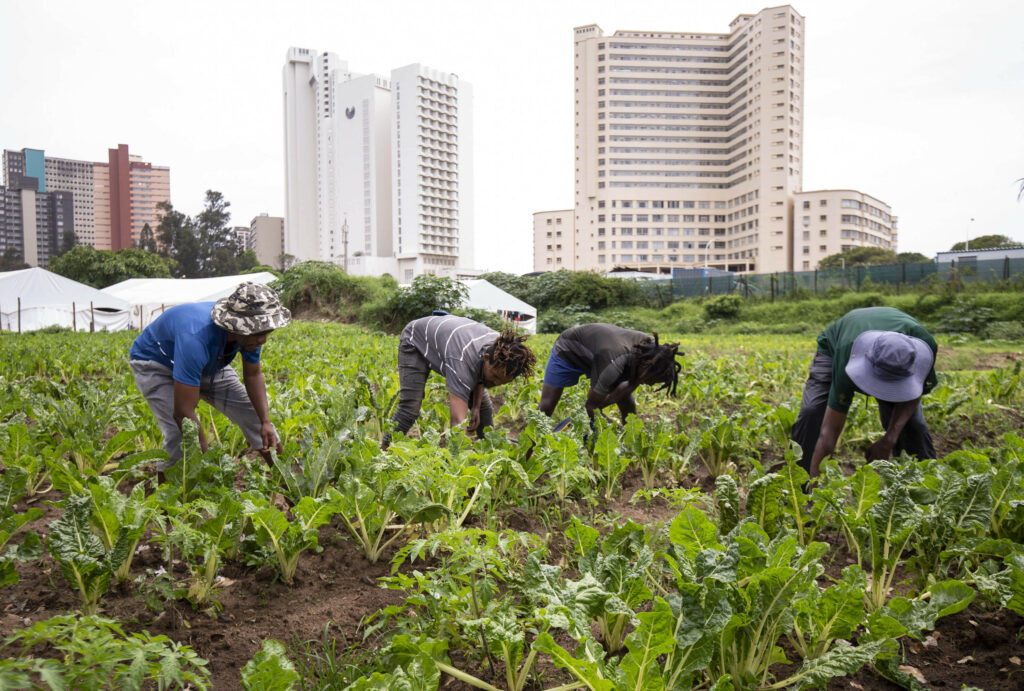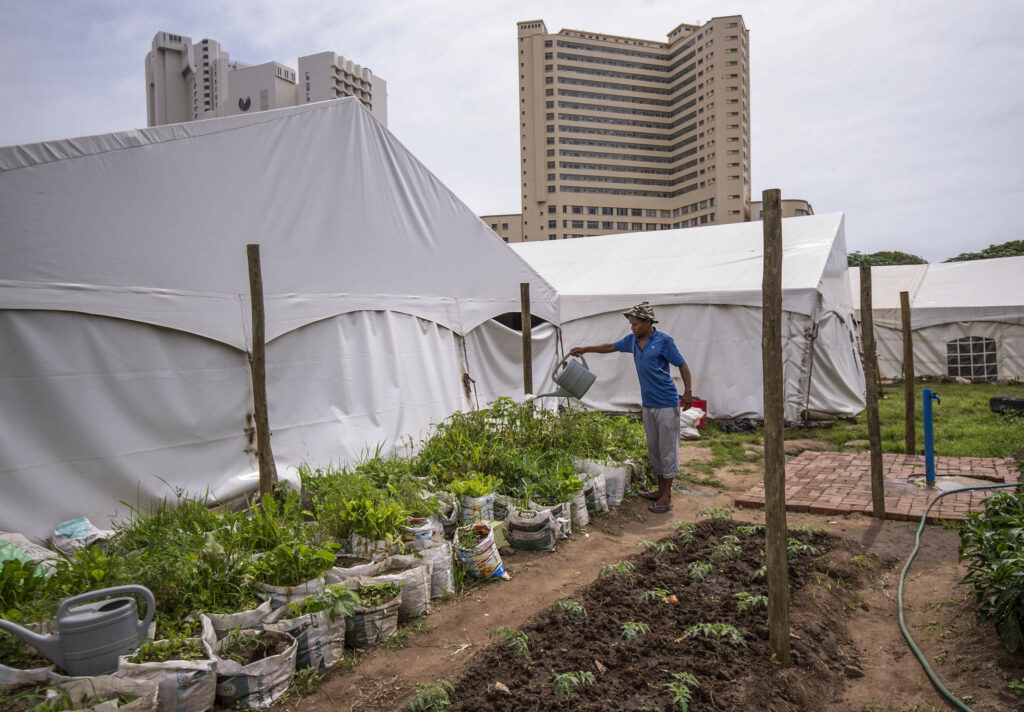they and other homeless people have been housed since the lockdown started. (Photos: Rogan Ward)
A group of homeless men living in an emergency camp on Durban’s beachfront have turned the Covid-19 lockdown into an opportunity to change their lives by starting an organic vegetable farm on a vacant plot next door.
The 10 men, who started off planting spinach in June, now have a thriving business supplying beachfront residents, nonprofit organisations and even a major chain store with a variety of fresh vegetables.
Their farm, on a vacant lot behind the Elangeni Hotel in North Beach, has been so successful that the group is now negotiating with the city for access to a second vacant plot, just behind South Beach on the other side of the Golden Mile, to increase their productivity.
The group — residents of Jewish Club 1, the call sign for the eThekwini municipality camp they have lived in since March 27 — are among the 700 homeless people who are still being accommodated in what is left of the 12 tented camps the city, backed by local nonprofit organisations, has been running since the lockdown was declared. The city still has four sites in operation: Jewish Club 1; Albert Park; Block AK and Strollers, which is home to nearly 200 destitute women.
These will be cut back to two permanent open safe spaces for men — one at Albert Park and another near the beachfront — and the Strollers building for women.
Marcel Greef, one of the farmers, came to Durban from the Free State two months before lockdown. The 25-year-old arrived in the big city in search of a job. The post on offer turned out to be a scam and Greef, without friends or family in KwaZulu-Natal, ended up on the street.
Greef has been at Jewish Club 1 since March 27, having first spent time being processed and undergoing medical examinations at the city’s Exhibition Centre.
He had worked on farms in the Free State, which helped him.
“There are farms where I come from. I had been working on the farms, so I knew a little bit about it. We do everything here by hand, ploughing, the lot. No machines. I’m proud of what we’ve done here,” he said.
Greef grew up wanting to be a football player, but is happy that circumstances have turned him into a farmer.
 Sizwe Mbatha, Marcel Greef and Sandile Mthembu are seen among the spinach on a piece of land where homeless people have been housed in tents during lockdown in Durban. (Image: Rogan Ward)
Sizwe Mbatha, Marcel Greef and Sandile Mthembu are seen among the spinach on a piece of land where homeless people have been housed in tents during lockdown in Durban. (Image: Rogan Ward)
“I would never have thought I could be a farmer. Serious. A soccer player, ja, but not a farmer. I actually love what I’m doing now. I’m a hard worker and I realise now that this is a nice job for me.”
Greef hopes the city will allow the group to continue using the land after the lockdown is eventually lifted. “After Covid, I don’t know. I hope we are all going to be able to hold on to the property, to turn this into an opportunity to become businessmen.”
He doesn’t want to go back to the Free State.
“I want to try and bring my family here. Where I am from, there are no opportunities for work. That is why I came here,” Greef said.
Sizwe Mbatha, 43, a percussionist, is one of the brains behind the farm.
“We spent a lot of time playing soccer and playing cards and doing nothing. I said to the guys, why don’t we try to start a small initiative so we can remember these days of Covid. Sandile and Mathonsi [two of the group of men who started the project] agreed and we asked for permission to use the land. It was empty and we could see that the soil was good,” Mbatha said.
With seed and tools donated by NGOs and individuals, the group planted its first crop of spinach in June.
“After a month, we sold our first crop. We took money out to buy more seed and supplies and we have carried on from there,” Mbatha said.
Most of the early sales came from passersby and from NGOs which were involved in supplying food and services to the camp.
Since then, the produce has been expanded to include tomatoes, several lettuce variants, cabbage, onions, green peppers, carrots and pumpkins. A seedling nursery is also under construction, with shade cloth that has been donated, allowing the farmers to add herbs to their offerings.
A bunch of spinach goes for R10; a kilo of tomatoes for R15 and a head of lettuce for R10.
Recently, chain store Boxer started buying from the farmers, taking 150 bunches of spinach every Friday.
“The target is 600 bunches a week,” said Mbatha. “With the extra land, we can do it.”
The retailer has also donated equipment to the farm, which is now supplying a number of restaurants with fresh produce.
Mbatha is hopeful that the city will allow them to continue farming after the lockdown is lifted.
“For now, we are here until further notice. It gives us hope. When we came here in March, we thought things were over for us. We thought we were done. We’ve come back from where we were. Now we have guys who are happy, who are getting paid,” Mbatha.
By the end of November, the farm had generated just over R30 000 for its members.
 Siphiwe Nene waters seedlings. (Rogan Ward)
Siphiwe Nene waters seedlings. (Rogan Ward)
One of them, Ndlebe, was able to return to his family in Cape Town, using what he had earned from farming.
“We booked him his ticket,” Mbatha said, proudly.
Although the farm is successful, its future is tentative, and dependent on the goodwill of the municipality for the use of the land. There has still been no decision as to what will happen to them after lockdown.
The municipality has shifted significantly in its attitude towards the homeless since the appointment of mayor Mxolisi Kaunda and deputy Belinda Scott last year. By the time the lockdown was declared, the city already had a joint forum with NGOs, which was able to provide assistance to nearly 3 000 people. The city has spent R60-million on housing and looking after the homeless and has budgeted R20-million for 2021 to fund the permanent facilities for them.
Scott said the Jewish Club site was “not ideal” but that the farm and the camp would remain where they were until the lockdown was lifted.
She said the municipality had been able to use the lockdown to push ahead with its programme to accommodate the homeless in safe spaces that would be permanent.
“Covid gave us a foot in the door to do something positive. It has allowed us to cement a relationship with the NGOs and the private sector to help the homeless. We have also repaired the relationship between the city and the homeless. It was previously very bad. There was no trust whatsoever. We had to overcome that,” said Scott.